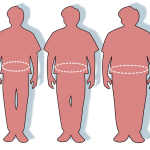The problem of obesity
Tackling obesity has now become a growing problem both from a national and an individual level.
Firstly, from a financial point of view, the estimated cost to the NHS of obesity is over £6 billion. More importantly, from an individual perspective, the impact of obesity can have a myriad of different negative effects. People who are obese are more likely to have heart disease, strokes, diabetes, cancer, and depression.
At the start of National Obesity Awareness week, we take a close look at the problem. But how do you know if you are obese, and what are the most sensible ways of tackling obesity?

Tackling obesity
Why tackling obesity is so vital
Obesity has such a stigma attached to it. However, the challenges that obese people face are not always as straight-forward as the layperson imagines. There can be psychological and physiological factors that make it harder for some people to lose excess fat than others. Weight-loss isn’t just a mathematical equation, for some people it is a major life challenge.
That being said, it pays to take an approach of awareness and acceptance towards the issue if you are to face it head-on. Overcoming obesity doesn’t just help you guard against life-threatening diseases, it can also improve sleep, lower blood pressure and help prevent osteoarthritis. In fact, the benefits of regaining a healthy body weight are endless.
How is obesity defined?
In the U.K. the most widely used method for determining obesity is Body Mass Index (BMI). Your Body Mass index uses your weight in kilograms divided by your height in metres squared.
According to the medical profession, a BMI between 20-25 is healthy. Overweight is a score between 25 and 29. And if you score over 30 you are considered obese.
However, as one of the main health risks of being obese is excess fat, many believe that body fat percentages may provide a more useful measure.
It is visceral fat in particular that causes some of the most threatening health conditions. If you want to measure and track your body fat accurately it is helpful to use the services of a professional, as many home use devices can be highly inaccurate.
Beating obesity in the long run
If you are in a position in which you need to lose weight it may help to take a fresh approach. If what you have tried previously hasn’t worked, then it is time to review your strategy.
Firstly, look to get the help of a nutritional therapist. Although there are reams of books out there offering advice, much of it is either misguided or too generic. A nutritional therapist will work with you as an individual and tailor make an eating regime that suits your particular needs. If you suspect you have a binge-eating disorder.
Secondly, give up the need to lose all the weight in super quick time. Permanent and sustainable weight loss requires a shift in mentality and a change in lifestyle habits. These take time to adopt. Crash diets and fad diets are not a long-term solution.
Lastly, incorporate exercise to support your goals, but don’t rely on exercise alone to achieve your goals. Find a form of exercise that is fun and you feel like you can stick with. There is no need to slave in the gym if it is not for you. Maybe starting a Pilates class or going to an up-tempo dance class would be a better alternative.
However you go about it – make it a challenge but not a chore. And if you can, find someone to share the journey with.
We hope this information is useful for you. If you have any questions about our treatments, please contact us. You can find us in Mill Hill Broadway and Islington. If you like this blog, please share! We are always happy to help.



